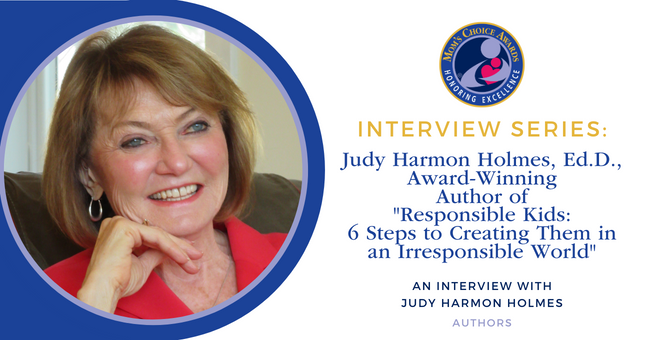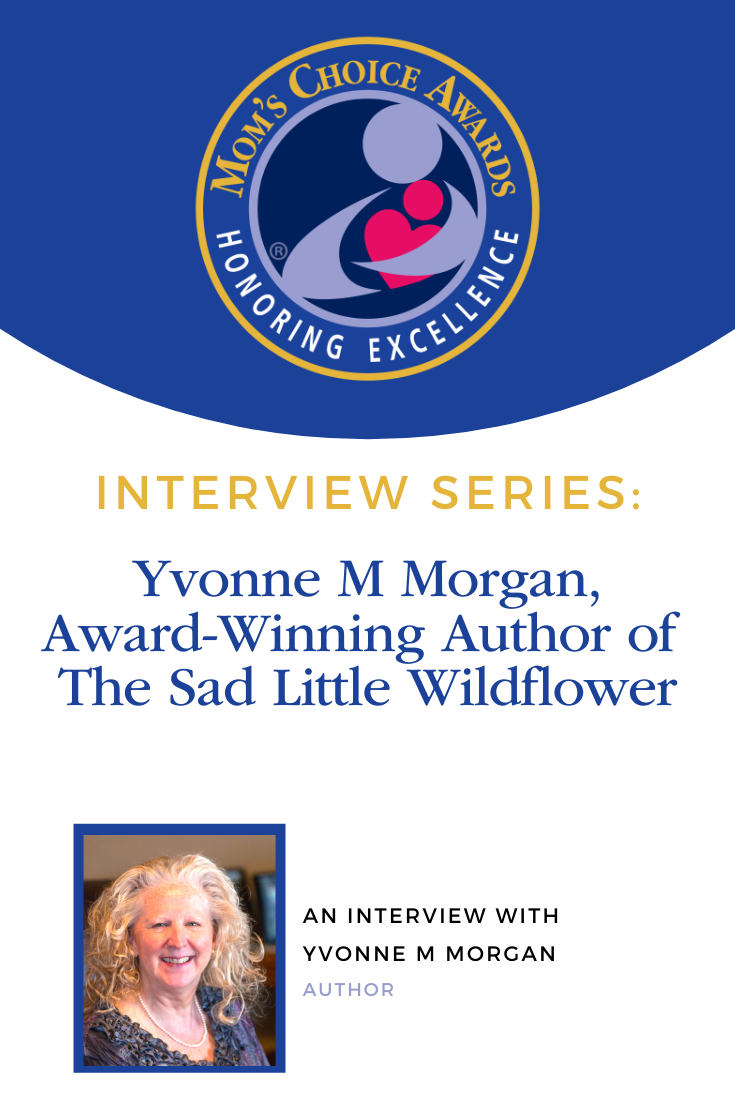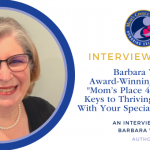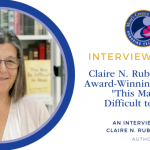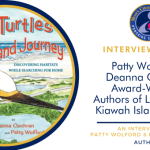Mom’s Choice Awards is excited to announce another post in our interview series where we chat with the inventors, designers, publishers, and others behind some of our favorite family-friendly products.
Hello, Mom’s Choice readers! Thank you all so much for joining us today for another interview with one of our wonderful honorees. We recently got the opportunity to sit down with Judy Harmon Holmes, author of the Mom’s Choice Award-winning book, Responsible Kids: 6 Steps to Creating Them in an Irresponsible World. Responsible Kids shows its readers, through many detailed examples, 6 effective ways to lead children and adolescents in learning how to become responsible and caring people. This book details how all learning is a process, so learning how to become responsible takes time. Each of the 6 ways requires the reader to spend a lot of time interacting with their children, and each way may challenge them to change the way they presently discipline. The outcomes are worth it—a parent-child relationship that grows in love and respect, and children who become responsible, loving adults. Keep reading to find out more about Judy Harmon Holmes and her amazing book, Responsible Kids: 6 Steps to Creating Them in an Irresponsible World!
MCA: Hi Judy, thank you so much for joining us today! We are so excited to have the opportunity to find out more about Responsible Kids and the author behind such an incredible book! Let’s start with the interview off with the latter, tell us about yourself!
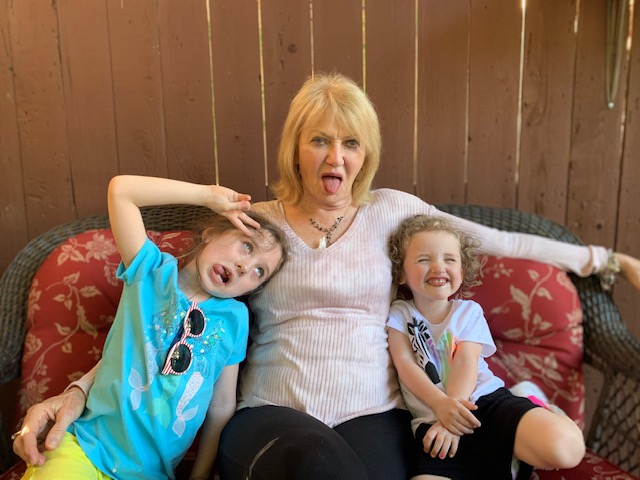
Judy Harmon Holmes with two of her grandchildren!
Judy: Up until I was four, I lived on Indian Reservations in Minnesota and Oregon because my father worked for the Bureau of Indian Affairs. Then we moved to Maine where I grew up, completed my education, and earned a Master’s Degree in School Counseling. Although both my parents had a college education, my mother was a stay-at-home Mom until I was in sixth grade and she and my dad divorced. Then she took a position teaching secondary English. Later, she remarried, and – one, two, three – I had 3 much younger siblings.
Growing up I was always involved in school activities and held a part-time job from the time I was old enough to get a work permit. I had lots of friends, many of whom are still my friends today. In high school, my friends called me “professor” because I always wanted to do my homework before going out.
My home life during high school was not the happiest because I didn’t get along with my stepfather; in fact, we were downright adversaries. I did love having my little brothers and sister around and often took them on dates with my steady boyfriend.
In fairness to my step-dad, I have to say his favorite words to me were probably part of the foundation for my present work of writing about effective communication and teaching a course entitled, Mindful Communication: Listening, Responding, and Sticking up for Yourself.” He would constantly tell me, “It’s not what you say, but how you say it that gets you in trouble.” He was right.
After marrying and having 3 daughters, I taught secondary English for 27 years, and then, having earned a Doctorate in Education, I took a position as a college professor for 12 years, and am presently Professor Emerita at Frostburg State University in Maryland.
Today, I’m Nana Maine to my 9 grandchildren and GG Maine to my 2 great-grandbabies. When in Utah with my #2 daughter’s family, we go hiking, snowmobiling, biking, skiing, and rafting – we’ve had exciting times and some very scary ones, but we continue to enjoy our outdoor activities. With my #1 daughter’s family, we go to stage shows, and concerts, explore Boston’s history, and museums, and to Maine. With my #3 daughter’s family, we go on walks, explore Baltimore’s historical places, go to the theater, have backyard bonfires, and have parties with the neighbors. My daughters and I try to plan a trip each year for just the four of us, and this past November we visited Savannah and Charleston for 5 days. In September we rented a cottage in New Hampshire for a week.
Moving to St Augustine was a long-time dream of mine, and my partner, Fred, and I enjoy exploring all the rich history of this beautiful area. We’ve made many friends and enjoy dinner parties, local theater, the weather, and the many available gyms. Presently I teach an interpersonal communication course in Flagler College’s Lifelong Learning Program, and I’m working on my second book (3rd if you count my 350-page doctoral dissertation, What Happens in a Secondary English Class When the Teacher Stops Judging Student Work? ).
MCA: You have such a big and beautiful family, that is so special! I’m sure they give you no short supply of writing inspiration. Speaking of writing inspiration, what was your path to becoming a writer like?
Judy: I’ve always loved writing and was successful at it in school, so naturally I thought writing would be a great career., I remember as a teenager telling my best friend’s older brother that I wanted to become a writer. His advice was that first I had to find something about which I knew a great deal. That process took me a long time.
I sold my first story – a story for children – when I was 22, but then a new editor took over the magazine and never published it. About a decade later, I entered the Maine Mothers’ Essay Contest and my essay won second place.
During my 27 years as a teacher, I wrote many articles on teaching, but published only one, “We Can Teach Students to Be Responsible” (Phi Delta Kappan, 1984) Then, as a college professor, I published research studies (as all professors do) and gave many presentations around the United States.
I would say that what inspired me was my own children first and then my students. I began to see that I knew so little about effective as well as caring ways to interact with them. Sure, I could tell them what to do, lecture them on the dire consequences of irresponsible behavior; I could discipline them through warning and threatening; I could punish them – but I slowly experienced that these actions didn’t model and create the caring, loving, relationships I wanted with them. I had to learn different ways, and this insight started me on the path to becoming a school counselor.
MCA: There are a lot of grateful parents who are big fans of your many teachings! Can you share with us some of the major themes that can be found within Responsible Kids?
Judy: My book has 3 major themes:
- The powerful impact adult modeling has on children’s behavior.
- The ways in which a Parent “lesson plan” provides clear guidance for parents and children
- The primary and essential role of responsible communication with children, adolescents, and all others (back to modeling).
Throughout the book, these messages are clearly explained and demonstrated with numerous true examples from my life as a mother, high school teacher, and college professor.
MCA: Tell us why you think the messages within Responsible Kids: 6 Steps to Creating Them in an Irresponsible World are important.
Judy: Raising a Human Being is the most important job anyone can ever do in life, and it’s the hardest job we’ll ever do. The irony is that we have little to no education for carrying out this process. (Most parents are flying the plane and learning how along the way.)
MCA: You talked a little about your background and what lead you to your writing career, but can you tell us more about the experiences that qualified you to write Responsible Kids: 6 Steps to Creating Them in an Irresponsible World?
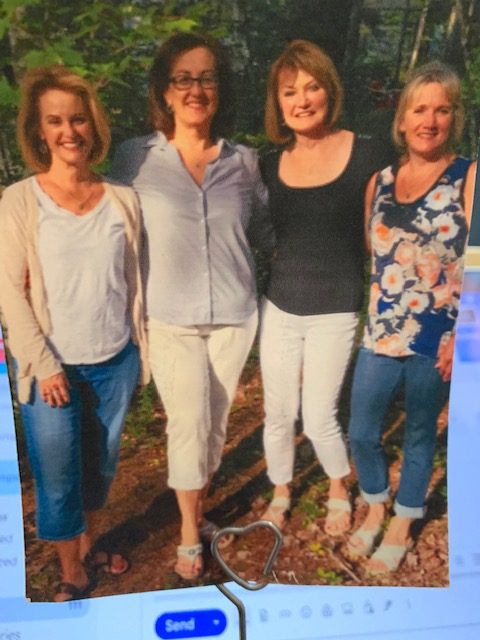
Judy and her three adult daughters.
Judy: Everyone who has already raised their kids and reads my book says the same thing, “Where was this book when I was raising my kids?” And my response is, “I was learning all the things in that book.” Of course, the highs of parenting are truly rewarding, and there’s a lot of angst as well. As a mother of 3 daughters, I encountered all the problems, worries, questioning of my own actions, and feelings of failure, while at the same time, experiencing these feelings with my adolescent students. I realized I needed to know more about developing and maintaining positive relationships and yet, still hold my children and students accountable for their behavior.
My husband and I took a course entitled Parent Effectiveness Training, and I enrolled in a School Counseling Degree Program. The first thing I learned was a set of communication skills that promote positive relationships, and these skills made (and continue to make) such a difference. Instead of issuing orders, criticizing, or judging my children and students, I used my new communication skills. I experienced much greater positive behavior from everyone, and our interactions became smoother and more rewarding. Interestingly enough, my children and my students hadn’t changed, but my approach to interacting with them and to disciplining them had changed, and that has made all the difference.
I’ll share 2 examples. A sophomore boy came flying into the classroom while flinging his books across the room, yelling “I hate this f…ing school.” Now the rule was that I was supposed to tell him he couldn’t behave that way in school and give him a detention. Before my new learnings, I would have done exactly that. My new learning was quite different; I responded by identifying how he was feeling. “Oh Robbie, I can see you’re really upset.” He immediately started crying and told me his girlfriend had just broken up with him. By recognizing how upset he was, I had allowed him to have his feelings and to process them rather than blaming the school for detention. He could have gone to the counselor’s office, but he chose to stay in class. Later, we talked about how he might handle that situation differently the next time he was upset.
The other example is when my 17-year-old decided to take my (brand new) car even though I had told her not to use it. Attempting to back out of the driveway, she put the car in drive and went through the garage door. When I returned home and found the accident, she told me, “it’s no big deal, Mom, because that’s why we have insurance.” Based on my new learning, I responded with an I Message instead of telling her how irresponsible she was, “I’m so mad right this minute, I can’t even discuss it. When I calm down we’ll talk.” And when I did, I told her I was so disappointed as well as sad that I had lost trust in her, and I was angry that she dismissed the whole thing.
As I continued to teach, I earned my degree in School Counseling and then a doctorate in Professional Development. At this point, I’ve had 40+ years of practicing positive communication skills, and I teach a course in Flagler College’s Lifelong Learning Program entitled, Mindful Communication: Listening, Responding, and Sticking Up for Yourself.
MCA: How do your daughters and grandchildren feel about you having included conversations from their experiences with teachers and parents within Responsible Kids: 6 Steps to Creating Them in an Irresponsible World?
Judy: This is funny. Actually, each of my grandchildren was more interested in the stories about their mother. They like seeing that their mothers got into trouble when they were young. My youngest daughter did exclaim when she found I had used her last name as well as her first in the book, but she was okay with it when she read the incident. It was in a situation for which she had every reason to feel proud.
MCA: What has the response been like to Responsible Kids: 6 Steps to Creating Them in an Irresponsible World?
Judy: I’m not sure how to respond to this one. People really like the title, and comment on the importance of the topic, “especially today” they say. Everyone who reads it has very positive things to say, and those whose children are grown wish the book had been available when they were raising their kids. I don’t have a lot of feedback from those presently raising their kids. I wish I did.
MCA: Well I think I can speak for a lot of parents when I say that we are grateful for books like Responsible Kids: 6 Steps to Creating Them in an Irresponsible World, and we thank you for writing such an insightful book! Please keep us posted on what you come out with next!
You can learn more about Judy Harmon Holmes and her award-winning book, Responsible Kids: 6 Steps to Creating Them in an Irresponsible World by visiting her MCA Shop page.

